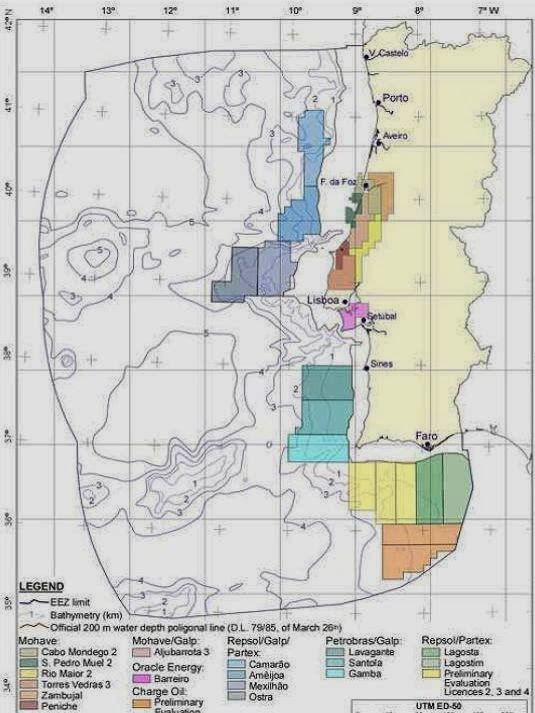 The Blue Business Forum at Blue Week which ended yesterday in Lisbon saw the Algarve well represented by organisations involved in scientific research, technology transfer and business, all dedicated to the sea.
The Blue Business Forum at Blue Week which ended yesterday in Lisbon saw the Algarve well represented by organisations involved in scientific research, technology transfer and business, all dedicated to the sea.
The Algarve University stand was visited by the Prime Minister, Pedro Passos Coelho, the Deputy Prime Minister, Paulo Portas, the Minister of Agriculture and Marine Affairs, Assunção Cristas and the Minister for Education and Science, Nuno Crato.
Algarve University management believes that "over these three days, the University of Algarve showed its potential, showing that it is a true marine and ocean University on a global scale."
Portugal currently controls around 4 million square kilometres of ocean yet it profits little from this huge area with the possible exception of fees from the lease of rights over oil and gas exploration blocs (see diagram below) which remain shrouded in secrecy.
It may be that the selling of these blocs is just the start as the government, desperate for easy cash rather than engaging in long-term planning for the economy, has an eye to this vast ocean area and is working on a deal with its European masters.
Assunção Cristas said at the Blue Week exhibition that "the point is to make Lisbon the capital of the oceans, the sea capital, bringing people to the country and showing what we have in terms of the ocean economy, science and innovation."
This drum banging for Portugal as some sort of marine expert hides from the electorate the true intention of the government which is working on a plan with Brussels to hand over Portugal’s ocean territory.
The area in question is a seabed not much smaller than the combined area of all the EU member countries - and Brussels wants it, or the rights to exploit it, which amounts to much the same thing
The Blue Sea concept sounds all very laudable and ‘eco’ but by incorporating Portugal’s huge maritime asset into a new European Sea, Portugal inevitably will cut a poor deal and release fishing, mineral and territorial rights to its European partners in return for beads and mirrors.
Much the same happened with Portugal’s fishing industry when Brussels got involved. The result is that Portugal consumes the second highest weight of fish per head in Europe but now imports two thirds of the fish consumed, 80% of which is caught by the Spanish fishing fleet in Portugal’s so called Exclusive Economic Zone.
Part of the plan is that Spain manages an Iberian Sea area as part of a new single European Sea devised by Germany which itself lacks much of a coastline.
One reason for Iceland and Norway not joining the European Community was because they refused to hand over their seas and sensibly still retain all associated rights.
Portugal’s cloak and dagger government covertly is preparing to negotiate away the nation’s maritime rights with the promise from Brussels that its ports, specifically Sines, will become a European hub for commerce and international trade and that Madeira, Azores, the Canaries and Cape Verde will become some sort of bizarre new strategic centre for military and economic power.
Sines can not be moved and will remain as far from the powerhouses of Britain and Germany with onward shipment by road, or trans-shipments adding to handling costs. Better to deliver imports direct to the northern European markets rather than dropping them off in Sines and loading them onto lorries, in the absence of a joined up rail system.
The few critics that are aware of the European Sea plan say that Portugal can achieve this economic focus without handing over its ocean area to Brussels and must invest now in science and communication technologies and the maritime economy, despite a government that remains genetically averse to having foreign businesses set up shop in Portugal.
The development of the ocean is what the Blue Sea exhibition in Lisbon was all about on the surface, yet at the same time the visiting politicians are working towards handing over power and control to Brussels, not harnessing it to the benefit of the country.
Portugal’s Carlos Moedas, a former Under Secretary of State in the Passos Coelho government and now a European Commissioner under Junker, argues that "the sea is of great importance for the European Union", and that the "blue economy in Europe is five million jobs and is a Union objective for 2020 is be able to increase this number jobs to seven million. This will depend on private investment effort, the public and all those who will contribute to this blue economy is really what differentiates us in relation to other continents."
Note the Commissioner’s lack of focus on Portugal and in developing Portuguese interests.
Moedas still has Passos Coleho’s ear and the current Prime Minister has proved himself a weak negotiator in Brussels, easily swayed by grandiose ideas and great European ideals in return for lamentably low returns for the country he purports to represent.
